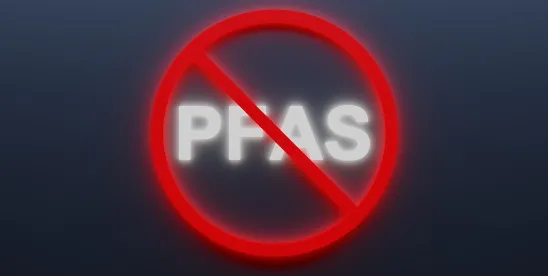On June 10, 2024, the U.S. Court of Appeals for the Fourth Circuit affirmed the U.S. District Court for the Eastern District of North Carolina’s decision to dismiss a case challenging the U.S. Environmental Protection Agency’s (EPA) response to a petition seeking a test order for 54 per- and polyfluoroalkyl substances (PFAS) for lack of jurisdiction. CEH v. EPA, No. 23-1476. The district court granted EPA’s motion to dismiss, finding that EPA granted the petition and that the court lacks jurisdiction to review such a grant. The appellate court affirmed the decision, with one judge concurring in part and dissenting in part.
As reported in our October 29, 2020, memorandum, on October 14, 2020, a coalition of non-governmental organizations (NGO) petitioned EPA under Section 21 of the Toxic Substances Control Act (TSCA) to request that EPA require health and environmental effects testing on 54 PFAS. The petition sought issuance of a rule or order under TSCA Section 4 compelling The Chemours Company (Chemours) to fund and carry out the testing under the direction of a panel of independent scientists. On December 28, 2021, EPA announced that it granted the petition and would obtain data through its National PFAS Testing Strategy.
On March 30, 2023, the U.S. District Court for the Eastern District of North Carolina issued an order granting EPA’s motion to dismiss, finding that EPA granted the 2020 petition and that the court lacks jurisdiction to review such a grant. Petitioners filed an appeal in the U.S. Court of Appeals for the Fourth Circuit on August 7, 2023, claiming that the lower court wrongly concluded that EPA “granted” their petition; that the court misinterpreted TSCA by concluding that EPA could grant the petition on the basis of a preexisting testing strategy with different objectives; and that the court misread TSCA by concluding that neither the Petitioners nor the court could compel EPA to issue test rules or orders requiring specific studies on particular chemicals. On October 10, 2023, EPA filed its response brief, maintaining the lower court correctly determined that EPA granted the petition and correctly dismissed the Petitioners’ complaint.
In the U.S. Court of Appeals for the Fourth Circuit case, Petitioners claimed that two aspects of EPA’s decision make it an effective denial of their petition: EPA chose to test PFAS as a class rather than individually and to use its own testing protocols instead of the program proposed by the Petitioners. Once EPA concludes testing is necessary, the court states that TSCA “mandates that the EPA ‘encourage[] and facilitat[e] . . . the grouping of 2 or more chemical substances into scientifically appropriate categories in cases in which testing of a chemical substance would provide scientifically valid and useful information on other chemical substances in the category’ in order to reduce testing on vertebrates.” According to the court, EPA “appropriately followed the TSCA’s requirements when choosing to treat PFAS as a class.” Once EPA determines that testing is necessary, “TSCA then tasks the EPA with ‘determining the protocols and methodologies’ necessary to conduct those tests so that it can specify how testing must be conducted in its final rule or order.” The court states that not only did EPA not effectively deny Petitioners’ petition by not adopting their proposed testing program, “by promptly commencing a proceeding for determining how to best test PFAS, the EPA gave Petitioners all that they were entitled to receive.”
The court concluded that EPA’s decision was a grant of the TSCA Section 21 petition and that the district court dd not have jurisdiction over the petition. The court noted that Petitioners are not without a future remedy depending on how EPA implements its testing program. Petitioners “are free to seek judicial review of any final order the EPA may issue” and “are also free to file a new petition with the EPA.” The court affirmed the district court’s order.
One judge concurred with the majority opinion’s determination that EPA properly granted the TSCA Section 21 petition with respect to the 39 PFAS that fell with the 6,504-member group of PFAS defined by EPA’s National PFAS Testing Strategy. The judge states that EPA’s decision not to include within that group 15 of the PFAS set forth in the petition rendered its decision a partial denial subject to de novo review, however, and dissented as to the portion of the majority opinion that concludes EPA granted the TSCA Section 21 petition regarding the 15 excluded chemicals.
The decision adds to a growing number of cases helping to define the utility and limitations of TSCA’s citizens’ petition provision.




 />i
/>i
